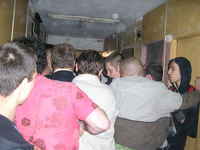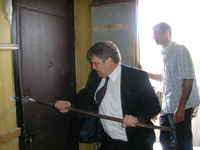Inhabitants forcibly removed from a hostel in Moscow with tear gas
On Wednesday June 25, troops from the Federal Prison Warden Service conducted a raid to forcibly remove families residing at the hostel located at number 19, Iasni Proezd Street, in the north of Moscow. For many years the Federal Service has been trying to gain possession of the premises to house prison employees. Judicial procedures have been progressing too slowly for the troops liking and those in charge of Moscow’s Prison Warden Service decided to speed up the process.
A little background to the situation is needed to fully comprehend it. The hostel, which was originally State-owned, was used by the textile factory “Smena” to house its workers. At the beginning of the 1990s, Moscow’s government also used it as a shelter for refugees fleeing from wars raging in various republics of the former Soviet Union, especially Abkhazia and Azerbaijan. In 1994, the hostel was illegally privatised by the Smena factory. When the factory closed down, it was handed over to the Federal Prison Warden Service. This information was not conveyed to the residents. 132 families have been living in this hostel since 1979 when Smena announced that it needed to recruit labour from the rest of the region. Along with the families who have been living in the hostel for more than thirty years (the hostel originally provided temporary accommodation), 16 refugee families arrived at the beginning of the 1990s. All of these people have formally been given the right to live in this hostel but they, in fact, do not exist on or have been removed from lists, sold and purchased like mere furniture.
Similar wangling is familiar to millions of inhabitants living in hostels all over Russia, who fell victim to the new housing Code and the inhumane logic of the property market. However, the Iasni Proedz hostel is known throughout the country as the place where the struggle by residents of workers’ hostels to defend their right to housing began at the beginning of 2005.
The first inhabitants, those of this hostel, established a residents’ committee, made appeals in the city and throughout the country to ensure that hostel residents were heard. It was only after numerous interregional protests that the uncertain plight of hostel residents caught the attention of the government which then officially recognized in 2006 the right of hostel residents to defend and protect their right to permanent housing…unless the hostel belonged to the city. Most of the hostels were illegally privatised in the 1990s by their inhabitants themselves. At the beginning of this century when the new owners wanted to “gain profit” from their buildings, it was already too late to take action because the statute of limitations had already expired.
However, the residents of Iasni Proedz took the necessary action in time and, for a long time, lodged complaints about the illegal takeover of the building by the Federal Prison Warden Service. Following several twists and turns-court rulings at times in favour of the residents, at other times in favour of the Federal Prison Warden Service depending on how the jury was made up- the case in still before the courts. The prison wardens therefore, have no legal reason for forcibly removing the residents of the hostel and even less of a reason for removing them themselves manu militari .
That is exactly what they did. The first raid was carried out on Tuesday, June 24. Police commissioners showed up suddenly with eviction notices issued by the courts for six people, refugees without any legal record or registration living in the foyer with their families. When they realized that the refugees in question had small children in their care and that the eviction notices did not make any mention of such children, they went away. After they left, however, approximately one hundred strong men, employees of the prison service and hooligans who were, no doubt, hired to do the dirty work, showed up. They entered the building via the fire escape on the third floor (where most of the refugees dwell), blocked exits on the floor, broke down the door to the refugees’ rooms and beat up any residents who were resistant. The other residents on other floors rushed to their assistance by were brutally brushed aside. Pitched battles took place upstairs, but at the end of it all, the third floor was completely evacuated and checked by troops of the Prison Warden Service. The families of refugees, their children and their belongings were removed from the building. Six families were evicted in total.
Most of the refugees were evicted on June 24 and 25 during the night. Many of the building’s residents as well as other supporters who came to back to protest against the forced evictions (especially young political activists and residents of other buildings under threat) kept watch and spent the night on the second floor of the building ready to ward off an eventual attack.
The night passed without incident and the following day in the early afternoon, the residents and their supporters decided to take back possession of the rooms on the third floor. Sergei Mitrokhin, MP of the Municipal Council of the City of Moscow and the new President of the Iabloko Party came to lend his support. Encouraged by the presence of an official and television cameras, the residents broke down the doors of the rooms on the third floor and the refugees reentered the premises. But not for long…in the late afternoon, troops from the Prison Warden Service, with back up, carried out a second raid, even more brutal than the one the day before. The third floor was quickly evacuated and troops attempted to raid the second floor where activists and resistant residents had barricaded themselves. Tear gas was used. Many residents, including women and children, were beaten. But the second floor held fast and would hold fast for several days after. Activists rushed to lend assistance to the residents but were blocked from entering the building by riot and were beaten and arrested by police for “disrupting public order”…They spent the night at police headquarters.
This incident caused an uproar in the Russian press because opposition politicians like Sergei Mitrokhin and others intervened. But particularly because the cynicism over housing battles had reached its peak and refugees had fallen victim first. The “ordinary" residents who have been living in this hostel for decades as they wait in vain for an apartment promised by the State now await their turn. A Federal Prison Warden Service, which is responsible for maintaining order in prisons, has been given authority to use force against peaceful citizens in blatant breach of all laws and court rulings.
When thugs employ methods used by convicts to evict undesirable occupants of a building which they themselves covet…


